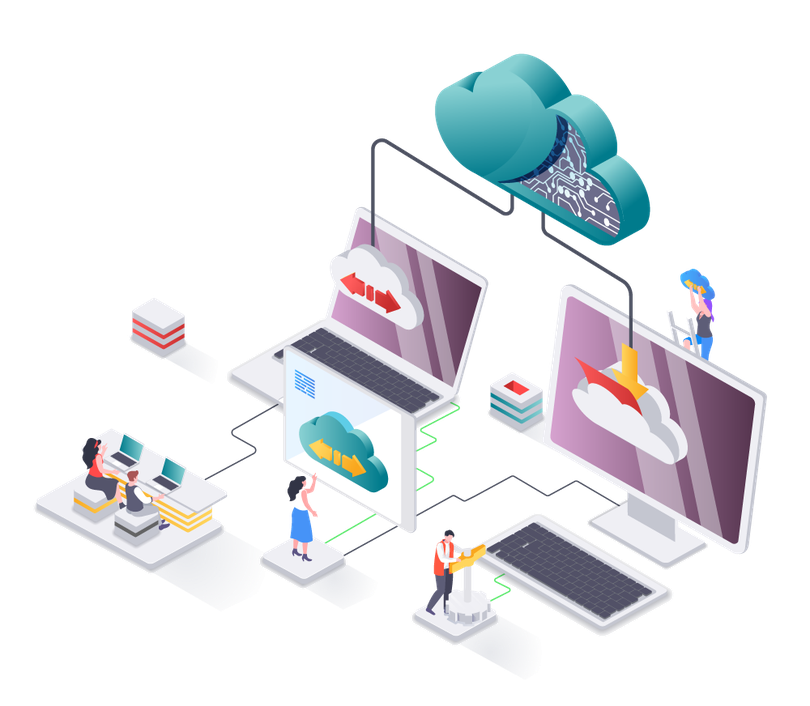


Server maintenance, monitoring & regular back-ups. ERP cloud hosting from raidlayer meets the toughest criteria for the safe & reliable hosting of your ERP system.
With us, you don’t have to buy and manage your data center for ERP software as our expert engineers do it all for you – from software patching to upgradation and monitoring applications.
ERP experts handle all the tasks pertaining to your ERP systems,lets your internal IT teams to focus on strategic initiatives such as building customer-facing app, creating new streams,decision making.
We follow the best security approach and have tools including biometrics, CCTV, key card systems, mantraps, and firewalls to keep your mission-critical data and assets protected against all vulnerabilities.
Our data center facilities are equipped to foster cloud ERP and other enterprise applications. You can easily spin up or spin down the computing resources to respond to changing business demands.
Our team of system engineers is available round-the-clock to assist, resolve technical glitches as well as ensure unparalleled business availability help you migrate and quickly troubleshoot any issue.
We work with different hosting providers worldwide that always deliver at least a 99.9% uptime guarantee.it comes directly from the hosting provider and excludes maintenance windows.
One of the main indicators is the inefficiency of your insights. In fact, if you are not able to correctly manage your inventory, keep monitoring customer satisfaction or simply transforming leads to clients, your company can greatly benefit from an ERP. The lack of collaboration between different departments across your company is also a bad sign and the streamlined processes thanks to an ERP would allow your company to function properly.
If you can’t reasonably manage the data you’re collecting – or even worse, can’t collect – then an ERP can be more than interesting for you.
Despite being a tool exclusively used by large companies for a long period due to cost, nowadays, ERP systems convene to almost any company if not all. The misconception that only large companies use ERP can be linked to the unawareness & misinformation concerning ERP systems. As a matter of fact, an ERP is a precious tool that allows any company – from SMEs to large companies – to automate business processes. Today, there is a diverse set of software applications – including ERPs – for companies from all industries. Thanks to an increase in the offer on the market, an ERP can now be adapted to any company and is definitely not something reserved for large companies. After all, any company would largely gain from the benefits of an ERP.
An ERP contains functionalities for diverse business processes such as finance, HR, inventory management, procurement, distribution and CRM. Its main goal is to streamline operations while centralizing information.
CRM stands for Customer Relationship Management & a CRM system is built to follow-up the satisfaction of the customers. In fact, whether it be thanks to better ad targeting or personalized communication, the main goal is to make customers happy. This is a software that is used by the front-office, meaning that only departments such as sales & marketing will use it.
Compared to a CRM software, an ERP can facilitate processes across diverse workflows – finance, HR, inventory management, etc. It is a system that encompasses the whole business while CRM is more targeted. In fact, it’s a tailored solution for customer-related matters. Nonetheless, an ERP – such as Odoo – can integrate CRM. In a nutshell, the main difference between these two is the scope – an ERP usually covers the functionalities of CRM & many others, while CRM focuses purely on the relationship management with your customers.
In order to correctly choose an ERP system, it goes without saying that you should deeply understand the processes in your company. In fact, if you don’t have a clear understanding of what your business requires, you might get off to a bad start concerning ERP implementation. Once you thoroughly determine which are the relevant parties & establish a list of requirements, you can then get off to a good start. One should also bear in mind that an ERP is the core component of a business’ structure & that integrating previously used systems can be fruitful. Another aspect to take into account is the references & reviews of current users. Indeed, seeking references from your industry or similar ones can help you make up your mind. Understanding how an ERP worked out for another company in a similar sector can clarify some questions & be influential in your decision-making.